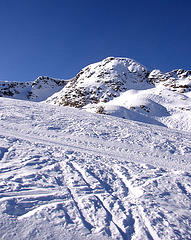
Photo credit: sgibbons on Flickr
I’ve known many people who landed their dream job of working at a ski hill. But, according to a story in the Nov/Dec 2012 issue, of WorkSafe Magazine there is a high rate of injury among this group of workers compared with others in BC.
The story reports that from 2004 to 2008, the annual rate of claims for ski hill employees was nine per 100 estimated person years of employment.
“The only other WorkSafeBC industry grouping to report that high a rate was the processing, manufacturing, and utilities sector,” reads the story, which describes the work of Delia Roberts, a biology professor at Selkirk College who created the Fit For Snow program.
Fit for Snow is an injury-prevention and wellness program that’s designed specifically for patrollers, instructors and lift operators working at snowsport resorts, to help them improve their on-snow performance and reduce their risk of injury, according to the the Selkirk College website.
The WorkSafe Magazine story describes Roberts’ two-year investigation into the causes of injury among ski hill workers. She found that 85 percent didn’t meet the minimum recommended water intake and most had double the recommended intake of fat and sugar. Despite high fitness levels on the ski hills, these workers need good nutrition and preparation to be at their best and avoid injury.
Recently a colleague told me about another project by Roberts. It looks at the injury and accident rates in log haulers and heavy equipment operators.
“The survey revealed that within the North American trucking industry, approximately 75% of the operators tested were obese, 37% were undiagnosed pre-diabetics (11% fully diabetic), and 95% of them suffer from chronic joint or muscle pain,” reads the Trucking at Selkirk College website.
Resulting from these findings is the Fit to Drive program for the lifestyle and demands of heavy vehicle drivers and equipment operators.
Of course it’s important to eat well and exercise, but clearly this message is not getting through. People on the run – like truck drivers, ski hill workers, and any of us who hurry – can be tempted to cut corners on our health. Of course it catches up, as we see from studies like this, but there are many ways we can make better choices for ourselves.
I’m very thankful to Roberts, her team, and the many sponsors whose funding and efforts guide people to healthier lives with fewer injuries. I first read about her work nearly a decade ago when she and her Selkirk team published Fit to Plant for treeplanters.
Diet and exercise are the cornerstones of that program, which prepares these workers to avoid injury and be “high-ballers” who get as many trees into the ground as possible. I wrote about the strains that can afflict these workers in my post Treeplanting lessons learned from experience.
For more on workplace health and safety for ski hill operators and other hospitality workers in BC, visit go2 – the human resource association for BC’s tourism and hospitality industry.



Thanks for your blog posting about my Fit to Work programs Susan. They have all started from the concept that our bodies are designed to perform physical work and with the right preparation we can do that work without getting hurt. That doesn’t mean long hours in the gym, it just means learning to use the right muscle at the right time. It’s also really important to make sure that you have the right kind of energy at the right time. Smoothing out blood sugar ups and downs increases reaction time, response to visual input and decision-making. All good things whether you are driving a truck, planting trees, skiing down a slope or just about any other task. It also really helps combat diseases like diabetes, high blood pressure and cancer to name just a few!
I hope that your readers will visit my websites and try some of the recommendations!